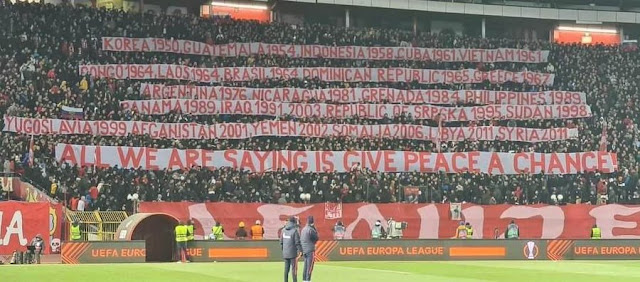The war in Ukraine is being fought online as well as in Ukraine. The Russian Federation is keen to deflect attention from its targeting of civilians, and the discovery of mass graves and torture sites in areas formerly occupied by its military. Fortunately for the successors of TASS, it has several decades of material to pull from and an eager audience.
One of the richest veins strangely has been to re-ignite the Yugoslav conflicts of the 1990s. And for even more audaciousness doing so by backing the expansionist nationalism of the Serbian far right. If you're even passingly familiar with that period and those clashes this would seem like a terrible strategy, but it's found fertile ground. Sympathy for the Serbian nationalist movement isn't a new phenomena its been around since the 1990, but it was relegated to the fringes. It was hard to maintain credibility when the Serb paramilitaries massacring Bosniaks in Bijeljina had taken a photography with them and let him take photographs of their executions and then proudly displayed them.
But we now live in the future, and those wars are in the past, so without the constant drip feed of fresh atrocities and military manoeuvres its easy for propagandists to play fast and loose. For example, you may have seen an infamous Time magazine cover.
I get why this is so often chosen by Cyber Chetniks. Its naked jingoism is offensive, and in a vacuum I can see plenty of people who have no interest in Serbia but are to a degree pro peace being vulnerable to this and similar messaging. For example, several Russian embassies have been using this to accuse nations condemning their barrage of cities hypocritical.
Well, the thing about this cover is that while it is obnoxiously celebrating military action, its supporting the destruction of a military outpost that had that same struck a market in Sarajevo killing 43 and wounded over 80 more.A man with no arm came into my shop, the blood gushing from his stump. Then he ran away. I saw the torso of a woman. She was still moving, but her legs were gone. The other day I saw something similar in a film. A beast cut a man in two, torso and legs. One was a movie, the other is our reality here in Bosnia. We are like a flock of little chickens squeezed into this cage of a town, chirping for help.
Another example of this strategy gained traction earlier in the war, fans of Serbian football club Red Star Belgrade unfurled a banner
Which looks great and pacific, but the give away is its inclusion of Republic of Srpska 1995 and Yugoslavia 1999. The former refers to the territory carved out of Bosnia & Herzegovina through ethnic cleansing. And Yugoslavia 1999 of course refers to the conflict in Kosovo where Serbian military tried to maintain control of that territory by reducing the population of Albanian Kosovans.
Red Star Belgrade, was founded during Tito's rule and was originally tied to imagery of Communist Partisans. But since then it has moved over to Serbian nationalist politics. The Serbian Unity Party was founded by a former president of its fan club Željko Ražnatović more commonly known as Arkan. Arkan had a shady past with organised crime and in the 1990s led his own paramilitary unit the Serbian Volunteer Guard (SVG) also more popularly known as Arkan's Tigers.
 |
| Arkan with members of the SVG and a stolen Tiger |
In 1997 Arkan was indicted for war crimes, in 1999 he was again indicted 24 crimes against humanity by the International Criminal Tribunal for the Former Yugoslavia. He was assassinated in 2000. In addition Red Star Belgrade's main sponsor is Gazprom Neft, Russia's third largest oil company. So, while the message may be good, I have a hard time buying that it is genuine.
You can oppose war and interventionism in general or this particular case, you can even be openly pro Russian Federation if you wish, without mourning the Serbian far right and lying about its brutal campaigns of genocide.
Indeed, it is such an easy thing to do that I am forced to conclude that those who have to resort to this method are motivated either;
- Ignorance, and ignorance in the extreme. Anyone sharing images from Serb nationalist sources or that Time magazine cover must know nothing about the conflicts that ripped apart the Balkans, and given how easy it is to lookup must not care much about it really.
- Genuine sympathy for genocidal nationalism.
Addendum
The break up of Yugoslavia was a bitter and complex conflict, it was also heavily documented and so there are many resources available to make sense of it. In an effort to help explain the complexities of the break up of Yugoslavia to an audience unaware, here are several documentaries dealing with it and its aftermath.
The Death of Yugoslavia
This documentary series recounted the conflict from the late 1980s to 1997. It interviewed dozens of political and military leaders from all sides including Milosevic and Radovan Karadžić. It uncovers and accuses multiple heads of government of complicity in crimes against humanity including the treatment of Bosniak prisoners by Croatian forces, and packs up every point with footage from multiple sources.Belgrade Radio Warriors - Turn on, Tune in, Slob out
Documentary on independent Belgrade radio station B-92 and Serbian's who lived through this period and opposed Milosevic's government. Life in Belgrade during the 1990s.
Frontline Football
Covers the 2006 clash between Serbia and Bosnia for the World cup qualifier. It covers the aftermath of the conflict and the connections between football and nationalism including Red Star Belgrade.





.jpeg)









No comments:
Post a Comment